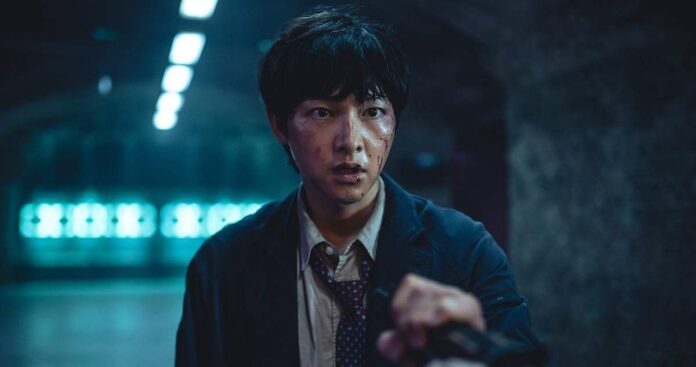Adapted from Cho Hae-jin’s 2011 book, Kim Hee Jin’s My Name Is Loh Kiwan is a riveting film. Told in a straightforward, earnest and poignant manner, it revolves around the subject of identity and the sheer plight of refugees everywhere. Proving one is a from a country with no civil liberties can be a tricky proposition, leave alone the fact the that the eponymous North Korean defector doesn’t speak any of Belgium’s languages (nor a neutral one, like English). His story mirrors that of many seeking asylum in various parts of the world. A tale of woe forces them to flee home only to live out a second-rate existence in a foreign, unwelcoming land. In the truest sense of the word, their lives may not necessarily be under attack, but basic survival, everyday racism, hatred and bigotry are things to contend with. In the end, there is no guarantee of a refugee status.
Director – Kim Hee Jin
Cast – Song Joong-ki, Choi Sung-eun, Waël Sersoub, Cho Han-cheul, Kim Sung-ryoung, Lee Sang-hee
Streaming On – Netflix
Loh Kiwan and his mother are illegal immigrants in China, having defected from North Korea. A struggle through and through, they are forced to keep their identities secret to evade arrest and eventual deportation. His mother holds down a minimum-wage job at a local restaurant to support them; Loh Kiwan has recently been in trouble, and the authorities are on the lookout for him. His mother shoulders the burden as he must keep a low profile. It’s an altogether desperate situation. Feeling guilty for having put his mother through so much, he makes an impulsive decision to walk her back in the biting cold after her shift. But the luck could not be worse for them, as the police is in the restaurant making enquiries about him. The mother and son make a mad dash for it through the backdoor. As they are about to outrun the cops, she gets hit by a moving van. Her dying wish is for her son to leave and live a life of dignity. His uncle (the owner of the restaurant) implores him to flee the scene. The following day, the former, beside himself with grief, hands the young man a ticket to Brussels with a thick wad of cash. When asked where he got all that money from, his uncle tells him that he sold his mother’s body to a hospital.
The premise of the film is extremely tragic. This is compounded by the fact that Loh Kiwan is a stellar young man – honest, kind, honourable, with a heart that can fill a room. And the worst indignities await him in a cold, alien, unfeeling place. Every bit of the character’s sheer goodness and spirit are embodied by Song Joong-ki’s faultless lead performance. When the worst fates befall good people, you take stock of the irony of life, its sheer scale of unfairness. The man deserves to be commended for his almost-childlike innocence and conscience. At a meat-packing job in Brussels, he asks his Korean-Chinese co-worker why she has to steal if she earns a half-decent living. When the volatile Marie (Choi Sung-eun) returns his wallet, he cooks her a full meal from the leftovers collected at a supermarket. At several meetings at the refugee centre, his anguish is palpable when the Korean interpreter mentions that his national identity requires more proof. With deportation well and truly a possibility, he is forced to make do. Sleeping in public toilets to escape the winter, selling bottle scrap for change, encountering violent thugs, facing indiscriminate bigotry from folk on the street. There’s no respite. His only solace comes when he develops a fondness for Marie, a troubled young woman with her own deep emotional scars and struggles with addiction.
The care with which each character is drawn up, be it major or minor, is one of the film’s strengths. The connections Loh Kiwan makes are a highlight. Marie has lost her mother in equally painful circumstances. A gifted Olympic-level markswoman, she works for a local mafia boss who runs an illegal, underground shooting den. Marie, his main possession, takes part in shooting competitions, with the betting being off the charts. She keeps returning to perform in order to get her fix. Her father is in no position to help. Then there’s Seon-ju (Lee Sang-hee), Loh Kiwan’s Korean-Chinese co-worker at the meat-packing factory, who looks out for him. This job halfway across the world funds her youngest daughter’s brain surgeries back home. It’s all a bit grim and bleak, but so true to life. The existence of refugees may be better than the horrors they escaped, but only just. The writing is so intense and unrelenting that you’re forced to pause, take a breather. You wait for the moments of light to filter through the cracks. Kim Hee Jin & Co. ensure that there’s much beauty to be had in that one, heavy word – hope.
At the heart of it, My Name Is Loh Kiwan is a romantic drama film. The bond between the lead character and Marie is an unlikely one, but one that works. These are people who will find the joy they so deserve in one another. Or that’s the expectation. A truly deep, character-driven film worth investing in!
#Loh #Kiwan #Movie #ReviewAn #intense #tragic #characterdriven #film #Cinema #express

